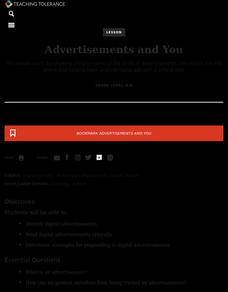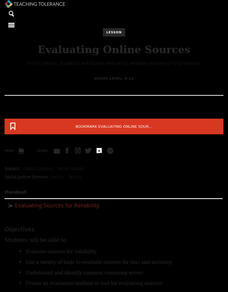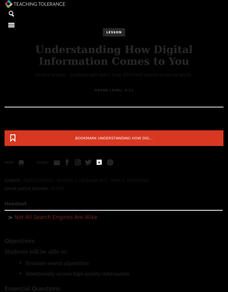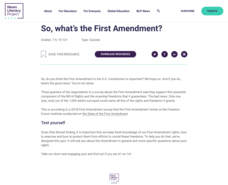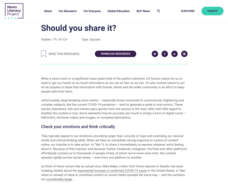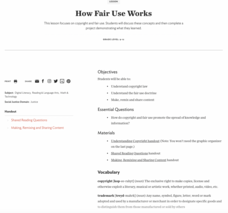Teaching Tolerance
Advertisements and You
Watch out for clever advertisements! Using the lesson, scholars learn how to identify online ads and respond to them critically. They then use what they've learned to develop a list of strategies to evaluate web pages.
Teaching Tolerance
Activism Online
People can make a difference in the world without leaving their homes. Using an eye-opening resource, scholars complete a handout as they consider the strengths and weaknesses of the Internet as a tool for social activism. Finally,...
Teaching Tolerance
Sensible Consumers
Girls like pink and boys like blue. Working in small groups, learners discuss stereotypes about children in advertisements. Then, scholars create their own manifestos about how they plan to respond to the consumer market they see in...
Teaching Tolerance
Advertising on the Internet
Believe it or not, everyone plays a role in Internet advertising. Scholars explore the topic with a podcast about Internet advertising and personal identity. Next, partners plan and produce their own public service announcements to...
Teaching Tolerance
Digital Activism Remixed: Hashtags for Voice, Visibility and Visions of Social Justice
It's time to discover hashtag activism! Using an engaging resource, learners explore viral hashtag campaigns relating to diversity, identity, and justice. Next, they either design their own hashtag campaigns or respond to existing ones.
Teaching Tolerance
Evaluating Online Sources
Newspapers, television, social media ... how do people get their news? Using the informative resource, scholars locate and verify credible sources of information. Working in small groups, they discuss strategies for evaluating the...
Teaching Tolerance
Understanding and Evaluating Online Searches
With billions of options to choose from, how can people determine which online sources are reliable? Using an informative resource, pupils first discuss and evaluate a sample search result handout. Next, partners create a checklist for...
Teaching Tolerance
Understanding How Digital Information Comes to You
Google, Yahoo!, Bing ... so many choices, so little time! Using the resource, scholars explore how different search engines affect the way they find information. After reading a handout on the topic and engaging in small group...
News Literacy Project
Get Smart About COVID-19
Pandemic or infodemic? Scholars complete an online quiz to determine if they can sort fact from fiction related to COVID-19 information. Pupils view a variety of news articles, social media posts, and video clips to practice identifying...
News Literacy Project
So, What’s the First Amendment?
The First Amendment to the US Constitution protects people's rights to speech, the press, and religion. Using the resource, scholars discover how. They take a brief online quiz to determine how well they understand the First Amendment.
News Literacy Project
Should You Share It?
Sharing isn't always caring. Scholars learn how to reduce the spread of misinformation on the Internet. They take an online quiz of example posts targeted to a specific audience. Using critical thinking skills, they see if they can tell...
News Literacy Project
Fighting Falsehoods on Social Media
It's time to stop misinformation in its tracks. Scholars take an online quiz to see how well they understand social media platforms' policies on spreading false information. After taking the quiz, pupils receive a score with an...
News Literacy Project
Story Explorers: Evaluate News Coverage
What makes an issue or event newsworthy? Scholars complete a K-W-H-L chart based on a recent news event. As they complete the chart, small groups collaborate to analyze coverage of the story or event.
News Literacy Project
News Judges
Order in the court! Scholars act as news judges, learning how to analyze the newsworthiness of several pieces of information. Working in small groups, they determine which events are most newsworthy and then complete graphic organizers...
News Literacy Project
InfoZones
Not all information is created equal. Scholars embark on a gallery walk around the classroom to view six examples of information and identify their primary purposes. Next, pupils complete a graphic organizer to evaluate the different...
Teaching Tolerance
How Online Communication Affects Privacy and Security
Digital footprints leave a lot of clues behind! Pupils discuss the positives and negatives of having a digital footprint and what it means. Then, using a handout, scholars learn ways to protect their online privacy.
Teaching Tolerance
How Fair Use Works
What's fair is fair! Using the resource, scholars discuss the key differences between fair use and copyright. Next, in small groups, pupils create and present projects that demonstrate fair use of copyrighted material, such as a song,...
Teaching Tolerance
News Consumers' Bill of Rights and Responsibilities
Believe it or not, people have rights as new consumers. Scholars read PEN America's News Consumers' Bill of Rights and Responsibilities and work in small groups to paraphrase chosen sections of the text. Next, they create and present...
EngageNY
Gathering Information about Screen Time: Assessing and Reading Internet Sources, Day 2
Calling all researchers! Using the resource, scholars continue conducting independent Internet research about a chosen research question. As they browse the web in search of articles to answer their questions, pupils paraphrase their...
EngageNY
Gathering Information about Screen Time: Assessing and Reading Internet Sources, Day 1
What's the best way to evaluate a source's accuracy and credibility? Pupils discuss the question with a partner and then share their ideas with the class. They also conduct Internet research, looking for an article that answers a chosen...
Teaching Tolerance
You Are the Product
What does it mean for a product or service to go viral? Scholars explore the topic by reading an article about the economics of social media. After reading, they complete a 3-2-1 data chart with information they learned from the text and...
Teaching Tolerance
Media Consumers and Creators, What Are Your Rights and Responsibilities?
Teach the class to separate fact from fiction. Scholars explore the topic of fake news as they read PEN America's News Consumers' Bill of Rights and discuss the rights and responsibilities outlined in the bill. Next, they read an article...
Eau Claire Area School District
Intellectual Property Lesson Plans
Fair use, intellectual property, public domain ... what does it all mean? Scholars act as judges to determine if different scenarios constitute fair use. They also advance their research skills by practicing paraphrasing and citing...
PBS
How to Teach Your Students about Fake News
What media literacy skills do people need to evaluate a news source? Scholars listen to and discuss an NPR story about how fake headlines often dupe young people and adults alike. Next, they study news stories, using a fact-checking...


